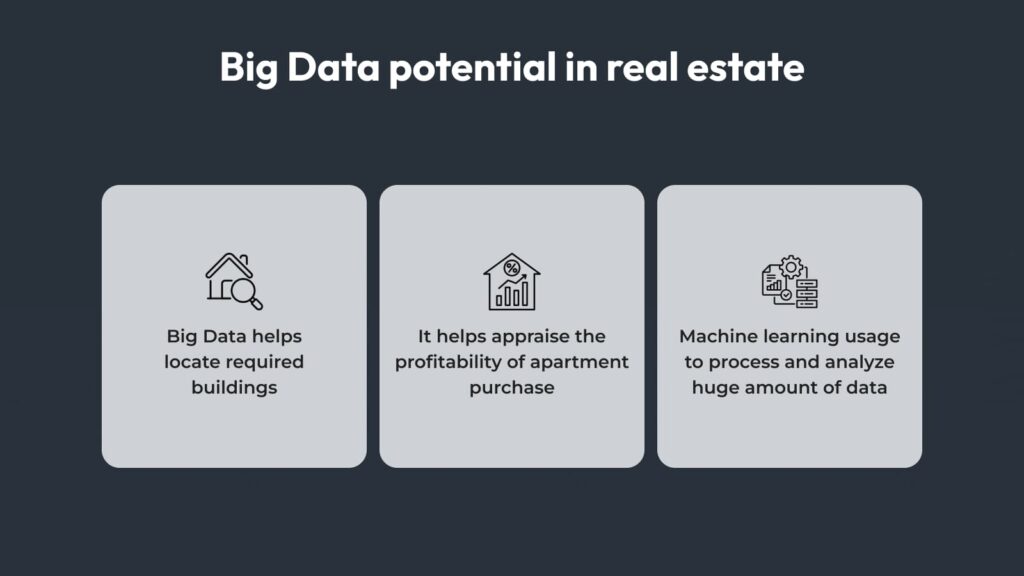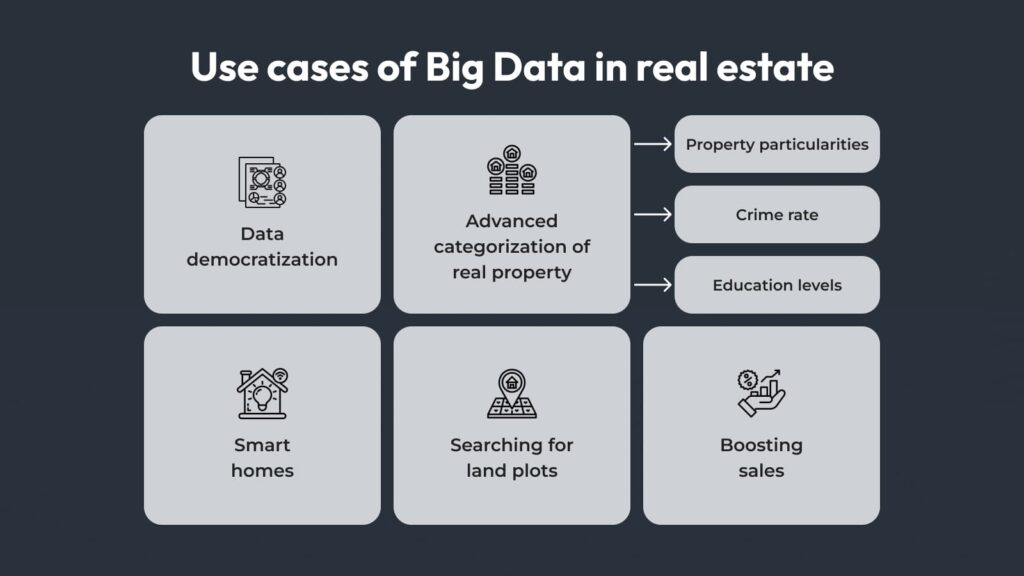The real estate industry has been impacted by the big data revolution. The vast amount of structured and unstructured information is useful for real estate domain as a powerful tool to better understand and manage its customer base.
If you are developing a real estate mobile or web app, discover this article. It offers valuable information on the potential benefits and reasons why incorporating big data may be essential for your app’s success.
How big data is revolutionizing the way we buy and sell homes
Real estate companies are operating in a data-rich environment. With advancements in data science and machine learning, these firms now have access to more information than ever before. This enables them to gain greater insights into customer behavior, market trends, and changing demographics crucial for informed decision-making.
Embracing big data analytics is becoming increasingly vital for real estate firms to remain competitive in the current market. Utilizing their data to the fullest, they will better understand their customers’ needs and predict what will work best in the future.

Benefits of big data in real estate
The real estate industry has seen tremendous advances in using big data. This technology can be used to analyze various factors that influence property and market trends, giving investors and buyers more information about their potential investments.
Here are some of the major advantages of big data in real estate.
Accurate forecasting. Big data helps to create accurate forecasts for property values based on past data and current trends. Investors can use it to make decisions about their investments, allowing them to take advantage of market opportunities.
Enhanced decision-making. By utilizing advanced analytics tools like predictive analytics, businesses can identify market trends and make well-informed decisions that will positively impact their operations. Big data allows real estate professionals to access valuable data about properties and neighborhoods, enabling informed advice on the best investments for their clients.
Smarter decisions. Having access to the data provided by big data can help investors make smarter decisions when it comes to buying or selling property. By collecting and analyzing large amounts of data from multiple sources, investors can better predict future trends in the real estate market.
Increased efficiency. Big data can also help to improve efficiency in the real estate industry by providing automated processes for managing properties and transactions. By automating certain tasks, investors can save time and reduce costs associated with property management.
Overall, big data is becoming an increasingly important tool for investors in the real estate industry. By leveraging data from multiple sources, investors can make smarter decisions and better understand the market dynamics that influence their investments. Big data provides valuable insights that can be used for innovative real estate app development to define potential risks, allowing investors to maximize their returns.
Examples of big data usage in real estate
Now let’s explore the various ways in which real estate companies utilize big data in their operations. Let’s take a closer look at some examples.
Data democratization and increased transparency. Real estate companies have been shifting their focus to data democratization, creating a more transparent and open market for both buyers and sellers. The primary goal is to provide reliable information that can help potential buyers and sellers in making informed decisions when purchasing or selling property.
Boosting sales. Big data has become a major factor in the real estate industry as it provides valuable insights to help boost sales. By leveraging big data analytics, real estate professionals can gain access to more detailed information on their prospects and customers, allowing them to better understand the buying patterns of potential buyers and tailor their marketing strategies accordingly.
Using big data analytics, real estate agents can get a better understanding of how their customers are searching for properties, where they’re looking, and when they’re looking to purchase. This helps them create more powerful marketing campaigns that target specific buyers and ensure they get the best return on investment from their efforts.
Real property selection by advanced filters. The use of big data in commercial real estate is extremely beneficial, especially for the selection process of potential land plots to build real properties. Using advanced filters to determine the ideal location for a project not only streamlines the process but also makes it more efficient and cost-effective. By integrating big data into their operations, companies will be able to reduce labour costs as well as gain efficiencies in decision-making.
Furthermore, big data can be used to predict future trends in office complexes, shops, and malls according to demand from customers by analysing factors such as seasonality or time of day. It also applies machine learning techniques which are applied with predictive analytical models. This helps companies make highly informed decisions on when and where they need to invest capital towards upcoming projects. Taking into account the innumerable benefits that come from utilising big data in real estate transactions, it provides an insightful array of details and valuable data points which help create better solutions for those investing in it.
Smart homes. Smart homes are increasingly popular in the real estate industry. Utilizing big data, real estate professionals can now offer their clients access to a modern and comfortable environment. Smart home technologies such as automation, AI-driven security, voice assistants, and IoT devices are transforming the way people live in their homes.
Big data is playing an important role in enabling smart home technology by providing developers with accurate insights about customer preferences. For example, analytics tools can help identify which features customers prefer, enabling developers to customize their offerings accordingly and ensure they meet customer expectations.
Big data also enables enhanced security solutions for smart homes, which provides peace of mind for homeowners and prevents potential breaches or unauthorized access. This allows customers to ensure their data is safe and secure at all times.

Conclusion
In conclusion, it is clear that big data analytics significantly benefits the real estate industry through its ability to provide meaningful insights from diverse sources. With this data-oriented approach, stakeholders are able to move from traditional practices such as intuition and speculation into a realm of evidence-based decision making; ultimately leading to increased profits for investors, successful investments for developers, successful sales for agents, and satisfactory purchases for customers.
If you need to implement all the benefits of big data to your business, the skilled outsourcing software development vendor can help you. The vendor’s specialists will consult you as to any tech questions you may have about the big data-empowered app development for your real estate company, and help you create such an app to boost your business performance and attract more clients.


